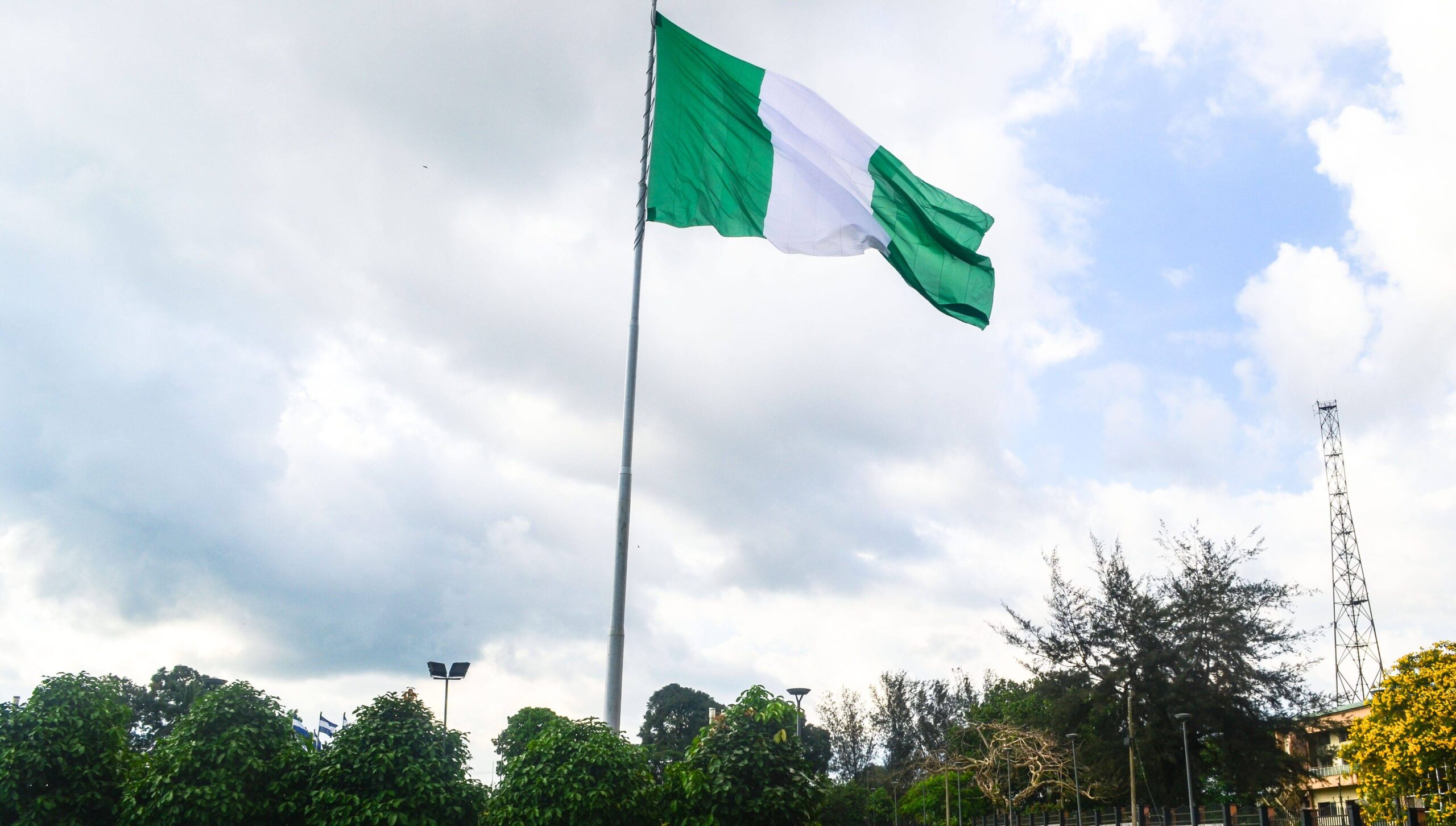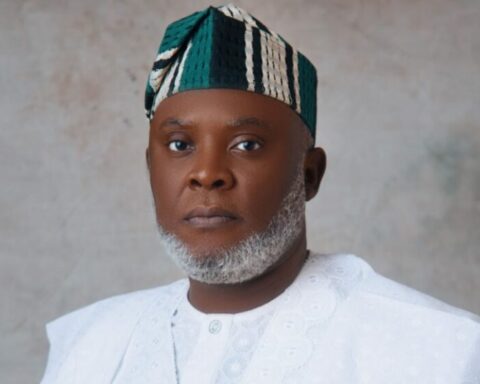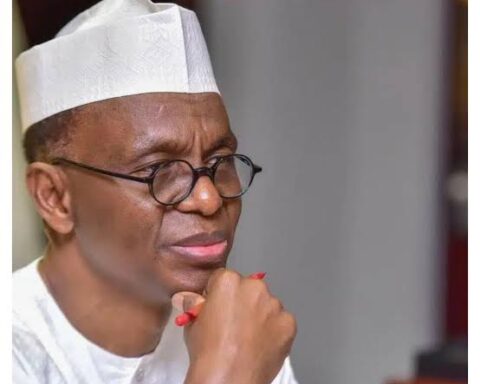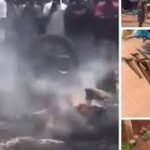By Charles Obiajulu Ugwu-PhD
There comes a moment in the life of a nation when silence becomes treason, when neutrality is cowardice, and when caution is nothing but a polite kiss on the cheek of disaster.
On the nation’s homegrown insecurity and the elite hands feeding it I dare to declare that:
the chaos is not accidental. It is engineered, protected, and now dangerously close to consuming everyone.
Nigeria has reached that moment stumbled into it, unprepared, unwilling, and still pretending that the ground beneath its feet is not dissolving. For years, Nigerians both at home and abroad have watched the security landscape unravel with the kind of cold amazement reserved for a collapsing giant who insists it is merely stretching. But the shock has now matured into a dangerous understanding: the threat consuming the nation is not a foreign invasion, not some mysterious force of nature, but a domestic cancer carefully fed by the very organs designed to stop it.
Let’s stop the diplomatic gymnastics. The insecurity wrecking Nigeria is not an accident of incompetence; it is a system with beneficiaries an economy, a political calculus, and a religious lever. And the villains behind it don’t hide in caves; they sit in convoys, occupy strategic offices, attend state banquets, and recite platitudes about peace while arming chaos in the shadows.
This is not a conspiracy theory. This is the only explanation that fits the evidence.
A Giant Held Hostage by Barefoot Militias
Strip away the excuses and you confront an uncomfortable truth: Nigeria, a nation that once deployed brilliant rapid-response missions in Liberia, Sierra Leone, and Darfur earning global commendation for discipline and tactical ingenuity has inexplicably struggled for decades to defeat loosely connected local militias with inferior weapons and negligible training. Militias so unrefined that they sometimes record videos on cracked phones, yet they move through Nigerian territory with the confidence of a sovereign state.
What does that tell you?
Not that the Nigerian military is weak. Far from it. Ask UN commanders who fought alongside Nigerian battalions in the 1990s and early 2000s they still speak with admiration about how Nigerian troops stabilized conflict zones that swallowed other armies. The Nigerian military, by training and demonstrated history, is not brittle. It is bridled.
When frontline soldiers whisper that they are “restrained” that operations are halted from Abuja at the exact moments when they could wipe out bandit compounds you begin to see the shape of the puppet strings. When officers speak of being ordered to “observe ceasefires” with groups that have murdered citizens in their sleep, you realize the state is not protecting lives; it is protecting relationships.
A question haunts every rational mind:
If unstructured, ideologically fractured bands of outlaws can hold the nation hostage for this long, what would become of Nigeria if a properly trained military from any neighboring state decided to invade?
The answer is blunt: Nigeria would be overrun in days.
The giant’s muscles have not disappeared rather they have been tied behind its back by the very people sworn to command them.
The State That Manages Chaos Instead of Ending It
Nigeria’s political class has perfected an ancient imperial trick: they weaponize instability to secure obedience. A frightened population is easier to manipulate, easier to distract, and easier to silence. A terrified nation does not demand accountability; it begs for survival. In this atmosphere, chaos becomes currency.
When you follow the money, the alliances, the ethnic alignments, and the religious patronage around insecurity, you meet the same truth again and again: someone profits from every attack. Someone gains from every school abduction, every pipeline sabotage, every highway kidnapping.
Insecurity in Nigeria is not merely tolerated it is monetized.
Think about it:
Which serious government negotiates openly with terrorists as though they were a recognized union?
Which country reintegrates militants into national security agencies while victims bury their dead?
Which nation receives intelligence dossiers from global allies identifying financiers of terror—and then pretends nothing was found?
A nation pretending to fight an enemy it secretly feeds is a nation preparing for self-destruction.
The Domestic Franchise of Terror
Nigeria’s insecurity is not external. It is homegrown nurtured, repackaged, and franchised like a profitable business model. Many of the so-called “unknown gunmen” are not unknown. Many bandits have office contacts. Many financiers sit behind mahogany desks with access to state funds. The architecture is domestic, porous, and sustained by a dangerous mixture of political ambition, religious extremism, and economic greed.
Let’s spell it out:
- Some politicians need insecurity to weaken rivals or redraw power balances.
- Some officers benefit from prolonged operations through inflated budgets.
- Some religious blocs exploit violence to negotiate relevance.
- Some elites use chaos to keep regions economically dependent or politically docile.
- And some businessmen thrive on contracts tied to the insecurity-industrial complex.
Nigeria has managed to turn death into a market. If this were not true, the carnage would not have lasted twenty years.
The Hollowing of a State
The true horror is not the violence itself; it is the slow erosion of national authority. Over two decades, Nigerians have watched the state shrink into a ceremonial entity grand in speech, toothless in action. The government behaves like a spectator, issuing condolences where it should wage systemic war against the roots of disorder.
But the hollowing is deliberate. A full-strength state threatens the vested interests of those who depend on fragmentation to maintain power. Weak institutions allow strong individuals to thrive. Fragmented authority enables private fiefdoms within government. A paralysed security architecture ensures that the real owners of violence the elite sponsors are never exposed.
Nigeria’s tragedy is not that the state is helpless. It is that those in charge have chosen helplessness because strength would expose too many secrets.
The Theatre of Pretence
Every atrocity triggers a predictable ritual:
- The government condemns the attack.
- Officials promise investigations.
- Committees are formed.
- Nothing happens.
- The next tragedy follows.
This cycle has numbed the national conscience, not because Nigerians are indifferent, but because they are exhausted. How many times can a people mourn without losing faith in the possibility of healing?
The most insulting part is the government’s permanent posture of surprise as though the patterns of murder, abduction, extortion, and territorial occupation are new phenomena that caught them unawares.
Nigeria is not ignorant. Nigeria is in denial.
A Nation on the Brink
There is a point after which a nation cannot reverse certain trajectories. Nigeria is dangerously close to that point. The warning signs are glaring:
- Communities abandoned due to bandit occupation.
- Farms deserted, crushing food production.
- Highways surrendered to kidnappers.
- Schools turned into hunting grounds for abduction syndicates.
- Local governments paying protection money to warlords.
- Security agents ambushed with sickening regularity.
- Ordinary citizens living with the fear of death as daily background noise.
A nation living like this is not “stable.” It is enduring a slow-motion implosion.
The International Community Knows the Truth
Foreign governments are not deceived. Intelligence networks have mapped the money trails. Satellite imagery has identified training camps. Communications intercepts have traced coordination lines. Dossiers have been shared repeatedly naming perpetrators, listing sponsors, detailing logistics chains.
And yet, Nigeria’s leadership repeatedly waves these reports away as though they are fictional. What does that tell you?
It tells you that the problem is not lack of information. It is lack of will.
No nation ignores actionable intelligence about those killing its citizens unless someone in power has something to lose if the truth is pursued.
The Coming Implosion—And Why No One Will Escape It
If Nigeria continues along this path, the end will not be dramatic at first. Nations do not collapse like falling towers. They dissolve like untreated wounds—slowly, then suddenly. And when the final rupture comes, it will not distinguish between the architects of chaos and their victims.
A society that normalizes violence becomes a bonfire waiting for the right spark. The elite who think their high walls and convoys will protect them are delusional. No fortification survives a nation-wide collapse. No private security detail can stop a country in freefall. When institutions disintegrate, everyone gets swallowed.
Chaos has no loyalty. And Nigeria is steadily courting chaos.
This Is the Last Call
This essay is not written to stroke egos or entertain academic circles. It is written because the hour is late—far later than the government admits, far more dangerous than the political class understands. Nigeria is approaching a point of no return, where the question will no longer be “Can we fix this?” but “How did we let it get this bad?”
The country cannot continue to manage insecurity the way one manages a seasonal allergy. It must confront the sponsors, dismantle the networks, expose the infiltrators within the security architecture, and rebuild a national identity that is not held hostage by fear or ethnic bargaining.
There must be:
- A full exposure of political actors benefitting from the bloodshed.
- A radical cleaning out of compromised security personnel.
- A forensic tracing of financial flows feeding insurgent groups.
- A decisive end to state-backed negotiations with killers.
- A reconstruction of national security strategy based on intelligence—not politics.
- A new social contract where human life is not expendable.
Nothing less will do.
A Final Word to Nigerians the People Who Still Bleed
Every nation that survived existential crises had one thing in common: the people rose before the system collapsed entirely. They refused to normalize death. They refused to let fear become culture. They demanded truth even when governments preferred silence.
Nigerians must now decide:
Do we continue living inside a lie that is killing us, or do we confront the architects of our national nightmare?
History is unforgiving to those who look away when destiny calls.
This is the final warning.
Not from foreign observers.
Not from political pundits.
Not from international agencies.
But from the lived experience of Nigerians who have tasted the ash of avoidable tragedy for far too long.
If the country fails to act now, it will not be because the truth was hidden. It will be because the truth was spoken, clearly and loudly—but dismissed until the nation ran out of time.
About the Author
Dr. Charles Obiajulu Ugwu is a contrarian thinker, creative philosopher, and systems analyst



























